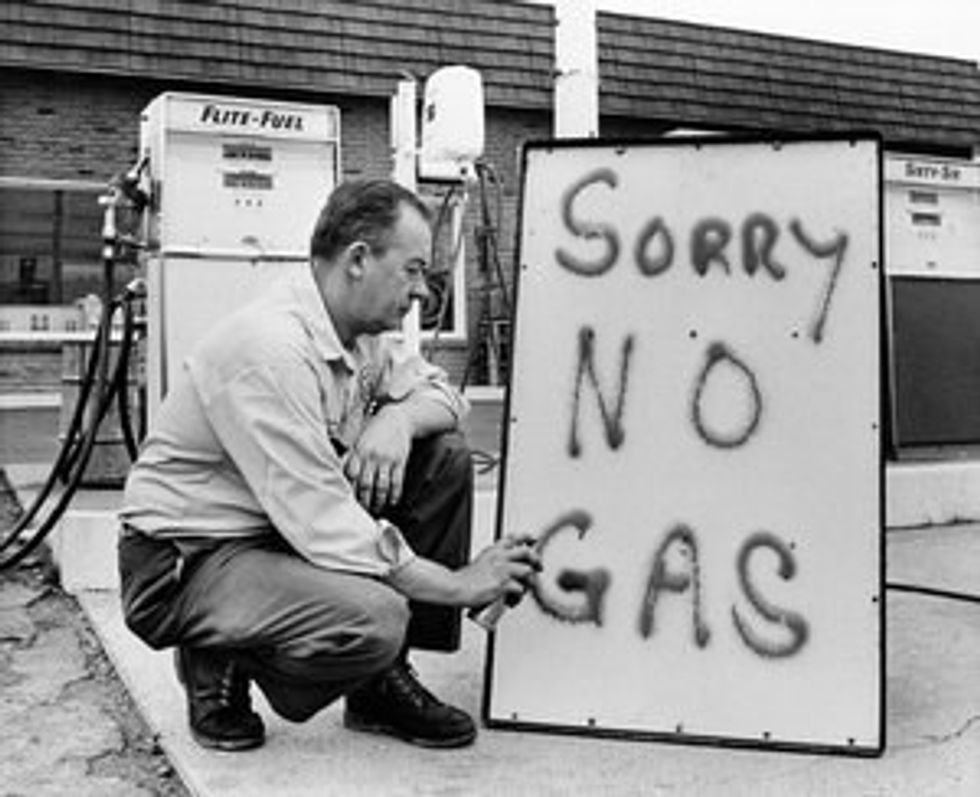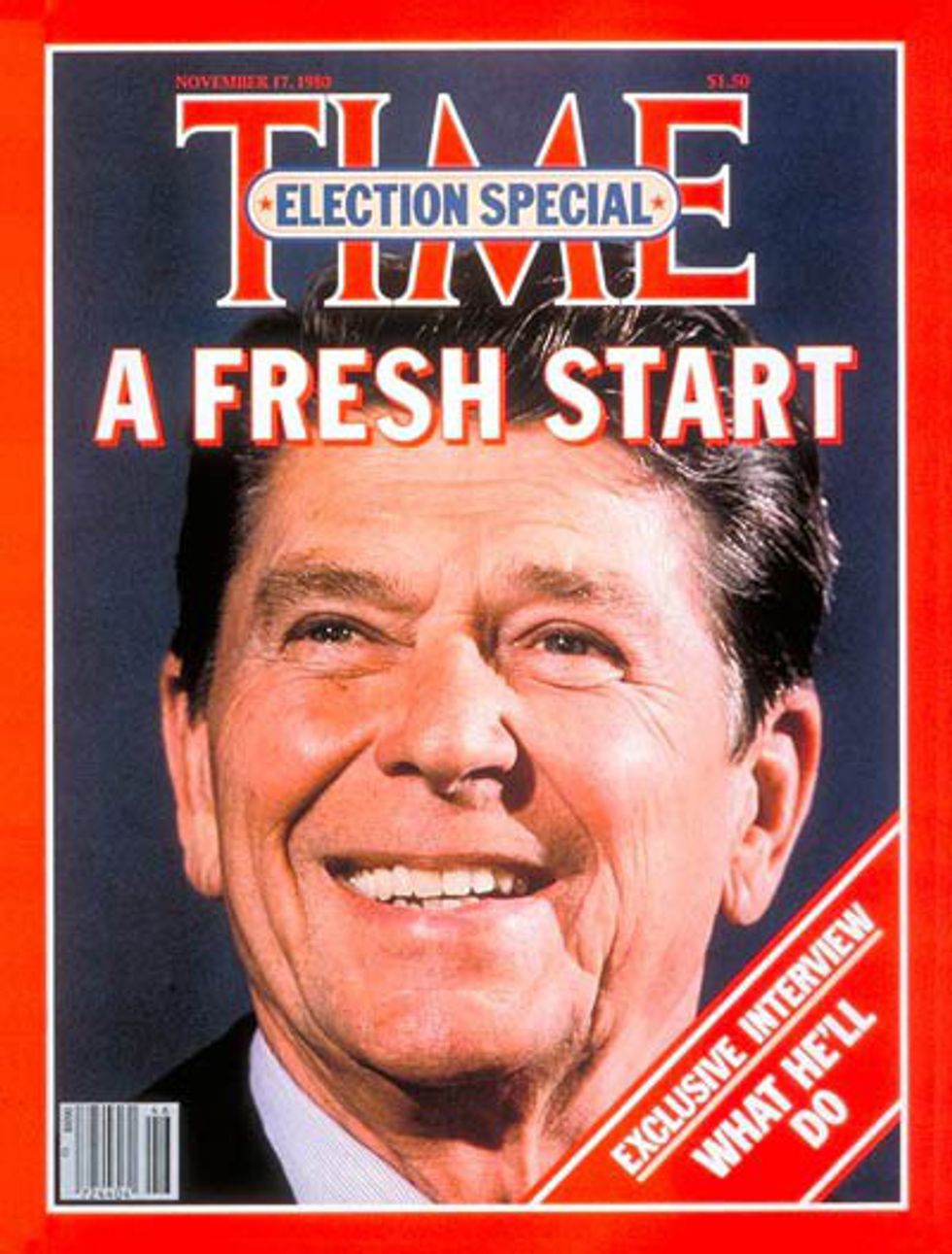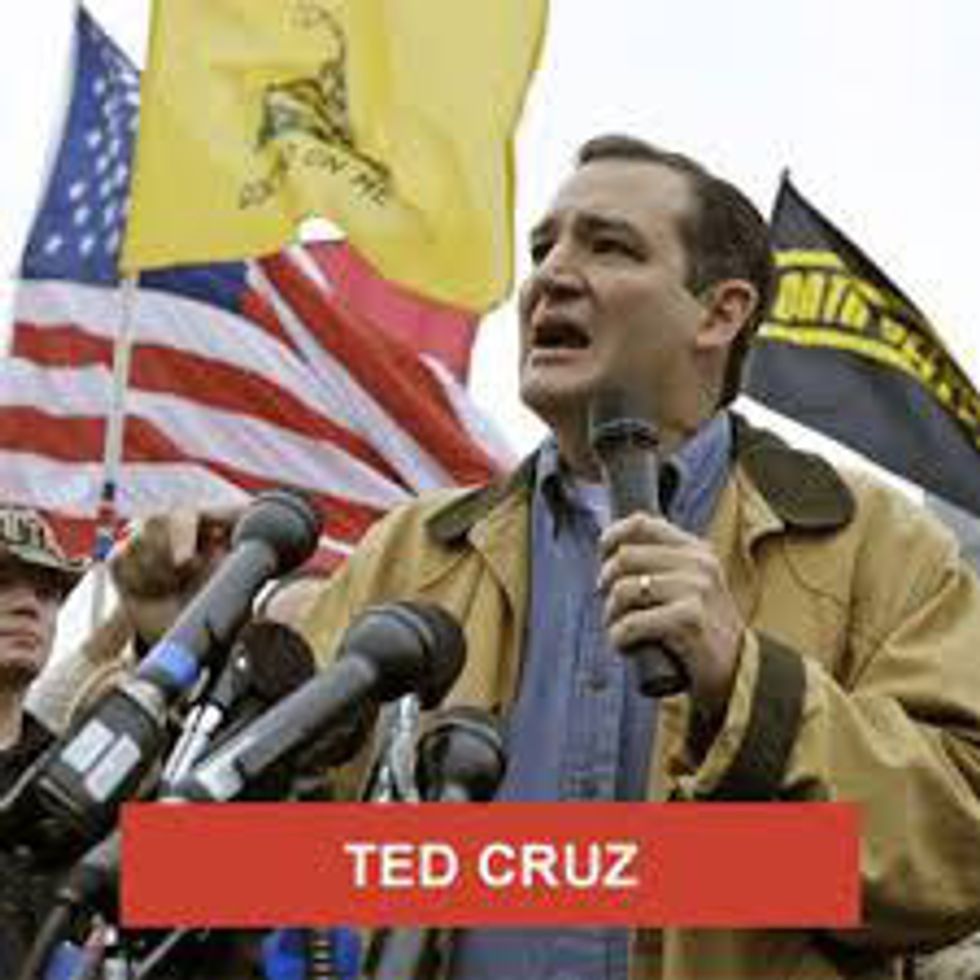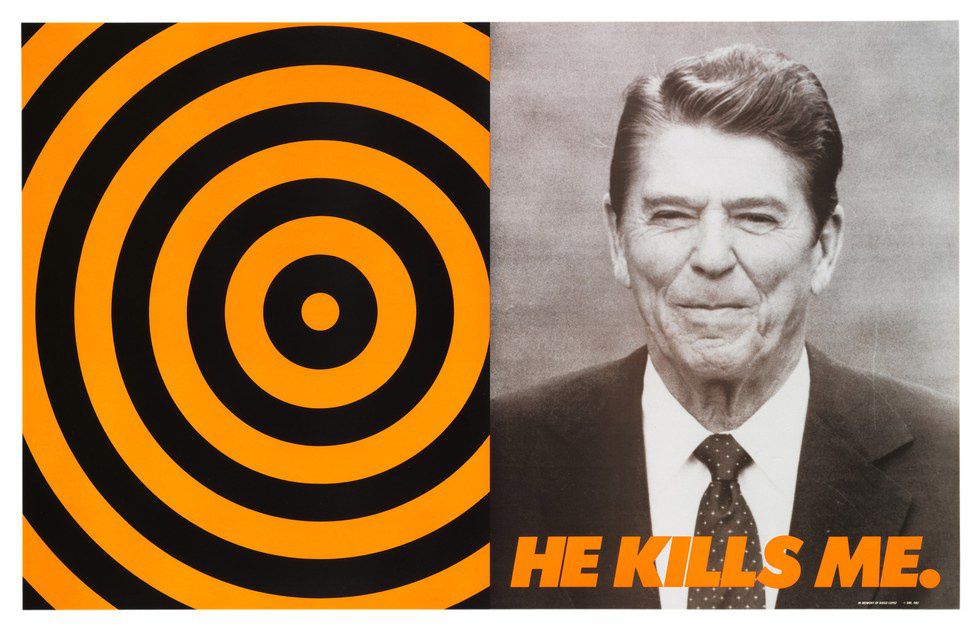I remember the funeral of Ronald Reagan very clearly. I was seven, and I still clearly can see myself sitting down in front of the TV and watching his funeral. That was the first time I learned about who Reagan was, and (obviously) the commentary during his death usually placed Reagan in a good light. So, at seven, I liked Reagan. I looked up to him. I thought he was a good President. It would be almost a decade before I realized that Ronald Reagan, 40th President of the United States, was not praiseworthy like the commentators of 2004- and the Republicans of 2016- claim him to be. When we consider the political and social climates of America, Ronald Reagan was (mostly) responsible for the revamped hatred that now courses through the American Conservative ideology. The man is to blame for the "us versus them" mentality that has tainted the political system, and for creating a climate of hatred, as well as making the disaster that is the 2016 Republican Party. Now, I was not alive during the Reagan Years. That being said, I have gotten to bear witness and experience the results of the Reagan Years. So, I ask patience, reader, as I explore the climate of America, post-Reagan.
1970s: The Rise of Reagan
The 1970s was not an easy decade for America. 1975 saw the end of the longest war in American history, and the only clear-cut defeat. The Vietnam war was a 20-year period that saw thousands of American and Vietnamese people dead for no other reason than "Communism is bad!" Reeling from this, as well as an oil crisis (1973 and 1979) and an energy crisis, and stagflation (a stagnation of the value of a dollar and inflation of the cost of living) really shook the country to its core.
The generation who had either been born right after the Depression or into the youth of The American Dream were now struggling with a certain feeling that hasn't really plagued the country since the depression: doubt. Things were in decline. We were no longer the powerhouse that won the Second World War, and thrived in the humble decadence of the Fifties. We were losing. In 1979, then-President Jimmy Carter would deliver his famous Crisis of Confidence Address, which some claim damned his 1980 campaign. In the speech, Carter called on the American people to take a good look at themselves as a way to "conquer the crisis of the spirit in our country..." Soon after the speech hit the airwaves, Conservatives (and Reagan in 1980) accused Carter of blaming the American people for the problems. In what is now a common political ploy, accusing an opponent of placing blame on the American people is equated to being anti-American. In retrospect, Carter probably was in the right to do such a thing although it never took off like he had hoped, because the Reagan method of problem-solving usually starts with, "Well I'm not the one at fault here, it's [insert group/person/another problem] to blame!" The speech ended up becoming a malaise for Carter.
So in 1980, while Carter's ideology was more rooted in addressing the problem as a means to fixing the problem, Reagan was articulating that Americans were not the problem, and that it's all the government's fault. Reagan was optimistic about America, and it was infectious. It was his charismatic speeches that won the election for him. It was also his first major fault as a politician.
The saving grace of the man was that he was an excellent speaker and did a top-notch job at making American voters feel irresponsible of any wrongdoing. His "trickle down economics" policy promised prosperity for everyone: the cup that runneth over will work its excess liquid down into the cups below. People loved it, and in November 1980, Ronald Reagan won 45 of 50 States. The Reagan Era had begun. And so begun the first days of American destruction.
1980: The New Right
Part Economic Conservatism, part Social Conservatism, and part Religious Conservatism, the New Right made up a rather large number of mostly Christian, mostly white American voters who were angry with the liberal, pro-government ideology that had been spreading since the Civil Rights Movement in the 1960s. Especially following Roe v. Wade (1973), Conservatives were looking for ways to stop the spread of amorality. Some members of The New Right were simply people who sought to reverse the racial climate of the 1970s, and see the Caucasian race in power. Others were businessmen who wanted a deregulation of private enterprise as a way to amass profit. Reagan capitalized on this in the late 1970s as Governor, and received a strong backing by the group during the 1980 Election. Again, by appealing to the American belief that "we did nothing wrong," and the promise to "get back" to the old days of the Fifties, where money was coming in and racism was going out, Reagan was able to slide right into the Oval Office.
Now, this in itself really isn't Reagan's true crime. His guilt comes from the propagation of The New Right's ideology. Even though The New Right isn't really prominent today, the effects of the roots it planted in the Eighties still exists. The Tea Party in 2010 gained prominence as being an offshoot of The New Right, seeking to practice smaller government in the fiscal world and tougher Conservative values in the social world. It has since fizzled out in name, but the crutch in the Republican party The New Right took in 1980 allowed the Tea Party to take hold in 2010, and now in 2016, politicians who echo the strong Conservative messages (see: Ted Cruz) of the Tea Party do so by embodying the mentality of The New Right. This is all because of Reagan's encouragement.
The effect of this? The Republican Party is now a breeding ground for extremist ideology, and the Democrat Party has to shift its ideologies to seem less extreme. Ted Cruz is a good example of the first part. He's taken the strict Conservative ideology with the harsh Dominionist sect of Christianity and turned it into a platform for the most hateful "traditional" voices to speak. The irony of this is that compared to Ted Cruz, Reagan would be Moderate. Even more ironic (and shocking), the politics of Hillary Clinton in 2016 are very close to those of Ronald Reagan in 1980, because she had to realign herself to appeal to what are now considered Moderates. Sorry Republicans, the man you aspire to is echoed by the woman you all despise.
1985: The AIDS Epidemic
The first reported cases of what came to be known as AIDS (Acquired Immune Deficiency Syndrome) were in 1978. Reagan did use the term AIDS until 1985, after more than 13,000 people in the US had died. He did not acknowledge it as an issue until 1987, after an upwards of 21,000 US citizens were killed by it. Technically, Reagan was not the reason the disease existed, but he was the reason the disease was not being curbed. In effect, it can be argued that the AIDS epidemic got worse because of Reagan's refusal to acknowledge it. His action (or inaction) resulted in stigmatization for the LGBT community. I'm happy to say that we've made long strides in the 38 years since AIDS was reported, but the Reagan Years definitely stunted that growth. I say this, because Reagan was no hero to the victims of AIDS, or the LGBT community. To back this up, I point out that Reagan's communications director, Pat Buchanan, referred to AIDS as "nature's revenge on gay men." How charming.
Today, the effects of Reagan's silence (and by proxy The New Right's involvement) has still pervaded. HIV/AIDS organizations, HIV/AIDS positive patients and their loved ones and the rest of the world still wonder how things might have changed in the US had Reagan offered sympathy, as opposed to silence, when the LGBT community needed hope, not hostility.
1981-1989: Tongue-in-Cheek Racism, The Rise of Incarceration, and Welfare
According to Department of Justice statistics, the number of incarcerated citizens in 1980 was 474,368. In 1990, the rate was 1,148,702. That's an increase of almost 250 percent. Reagan never overtly condoned racism, nor did he actively try to dismantle any kind of Affirmative Action, but his campaigns are marked by a massive population of white support and subtle prodding of racial tensions, especially in the South. In 1964, Philadelphia, Miss. went down in history as being the place where three civil rights activists were murdered. 16 years later, in that same town, Reagan would kick off his campaign, citing State's rights. Now he never overtly made any remark about the murders, but it can be justified that Reagan alluded to the Civil Rights Acts that effectively nullified (mostly) Southern State's rules regarding racial interaction.
I wouldn't say Reagan was a straight-up racist, but he did harbor a kind of indifference for the black community, doing what he can to stir up trouble with his divisive rhetoric. What's more telling, though, is his 1988 veto of a new Civil Rights Bill, and his support of a 1982 Bill that extended the life of the Voting Rights Act, which called for an oversight on state changes of local election laws. This was especially pertinent in the South, where many voting districts made it nearly impossible for people of color to vote. These things, in tandem with Reagan's veto of the Anti-Apartheid Bill suggested some kind of indifference.
The outcome: Even though it's popularized as being true, Reagan did not coin the term "Welfare Queen." He did, however, capitalize on it in 1976, and a little in the Eighties, when he cited the people who abuse the welfare system as being the problem in the US (again, Reagan problem solving starts with, "Well I'm not the one at fault here, it's [insert group/person/problem] to blame!"). He lost the 1976 Election, but that kind of rhetoric resurfaced some during his Presidency.
Today, like with the LGBT community, the black community (who also happen to make up a majority of those on social welfare programs) is fighting institutionalized racism that- if not in policy, at least in ideology- was stemmed by Reagan's indifference to racial tensions. In Baltimore alone, the school-to-prison pipeline is seeing a spike, as "moderate" Republican Governor Larry Hogan is looking to cut education funding to build a new, larger jail for (black) youth. This kind of policy only comes from racial indifference, and blase support for race programs intended to help those in need.
1981-1985: The Decline of Mental Health Treatment
In 1980, soon before he left Office, President Carter signed the Mental Health Systems Act, which sought to improve the quality of care of people in mental health institutions by increasing funding and research. In 1981, Reagan repealed it, and signed in its place the Omnibus Budget Reconciliation Act (OBRA). Reagan's 1980 Campaign consisted of three things: Cut domestic spending, cut taxes, increase military. OBRA did that. Some of the rationale for this policy was to decrease the national debt. After it went into law, ironically, the debt almost doubled and the US went into a Recession. Part of the domestic spending cuts included a reduction in federal funding for mental health institutions. Federal spending for mental health dropped by 30 percent in 1981. By 1985, Federal spending for mental health was capped at 11 percent. It was almost exclusively on the States to support mental health institutions and research.
Because of this, many states closed down facilities and the ones that stayed open saw dramatic increases in population and dramatic decreases in quality of treatment and maintenance. This decrease in funding for mental health facilities and research also led to a subsequent spike in the rate of people with mental health issues being incarcerated.
Today: The lingering effects of the cut spending on mental health institutions saw an increase in arrests, as well as an increase in the belief that the mentally ill patients who are now no longer in treatment facilities are threats to the general public. In effect, it became easier to have people who might be dangerous (in the eyes of "good American citizens"), or otherwise just antisocial, imprisoned under that pretense. Today, awareness and funding for mental health issues have significantly improved, no thanks to Reagan or his admirers. Rhetorically, however, Conservatives today tend to treat mental health (and federal spending on it) as a stigma.
2016: America Today
During their bouts with Donald Trump, numerous Republicans have brought up Reagan in remarks to the party. Recently, Marco Rubio referred to the GOP as the "Party of Reagan and Lincoln." In the last few years, tee shirts and bumper stickers that don the "Reagan/Bush '80" stamp are hitting the shelves. Nearly every Republican politician talks about how great Reagan was. They make the man out to be a prophet, a poster boy, for the Republican Party.
Even just everyday Republicans reflect back on the "good ole' days." Those who didn't exist during the Reagan days reflect on it in such a way that they wish they had.






















